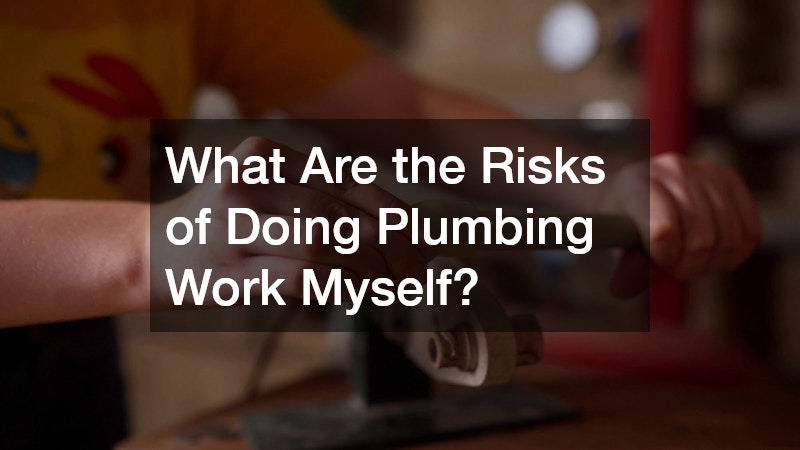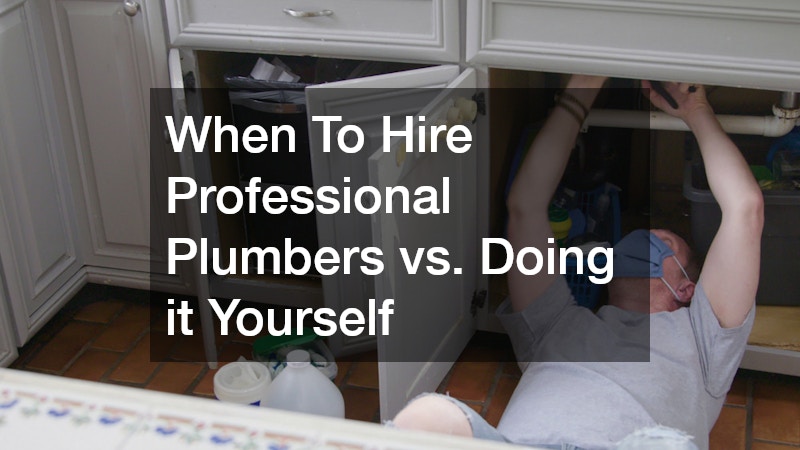Understanding when to undertake plumbing jobs yourself and when to call a professional can save both time and money. This guide aims to help homeowners navigate these decisions by exploring common situations and criteria for selecting the best approach. A wise blend of caution and knowledge empowers you to make smart choices that ensure the health of your home’s plumbing system.
What Plumbing Tasks Can I Do Myself?
Explore minor plumbing issues, such as leaky faucets and clogged drains, that are generally safe for homeowners to tackle without professional intervention. These tasks often require only basic tools and a little patience, making them manageable even for those new to DIY initiatives.
However, it is imperative to recognize one’s limits to avoid exacerbating minor issues into significant problems.
Replacing a showerhead, for instance, is straightforward and primarily involves unscrewing and reattaching components. Similarly, unclogging a minor bathroom or kitchen drain can often be resolved with a plunger or a drain snake without the need for sophisticated equipment. Such tasks not only boost confidence but also save money on unnecessary service calls.
Fact: Small maintenance tasks like these prevent more significant issues and extend the lifespan of your plumbing. Hence, while DIY repairs offer an immediate cost-saving benefit, they also serve as preventive measures that contribute to longer-term solutions. Ultimately, understanding which tasks fall within DIY’s realm can transform your home maintenance approach.
When Should I Call a Professional Plumber?
Identify the red flags that indicate a project exceeds DIY capabilities, such as persistent leaks, water heater issues, or major pipe repairs. The sudden emergence of water stains on your walls or floors can serve as a warning signal of deeper problems. Consulting a professional in these instances ensures thorough inspection and proper resolution.
A professional plumber possesses specialized tools and expertise that facilitate effective solutions for complex issues. For example, a malfunctioning water heater affects comfort and can lead to energy inefficiencies and higher utility bills. Hiring a professional can prevent these unintended consequences and restore functional harmony to your household.
Ignoring significant issues may compound problems, resulting in greater expenses and potential damage over time. It’s crucial to recognize the point at which DIY shortcuts jeopardize both safety and efficacy, prompting the need for expert intervention. A professional can carry out necessary repairs while ensuring compliance with local regulations, providing peace of mind.
How Do Costs Compare Between DIY and Hiring a Professional?
While the initial investment in plumbing tools and materials may seem relatively cost-effective, repeated mistakes or poor-quality work can quickly lead to increased expenses over time. In addition to the upfront costs, ongoing issues such as leaks or system failures can result in costly repairs and the need for replacements. Moreover, inefficient plumbing systems often contribute to higher energy bills, as water heaters and appliances may need to work harder to maintain desired temperatures or performance.
While DIY endeavors can appear enticing due to perceived affordability, one must consider the eventual need for professional correction. Conversely, professionals bring vetted experience and can often detect and preemptively resolve hidden issues in a single visit. The financial implications extend beyond immediate costs, including the potential for increased property value through assured and prudent plumbing.
Prioritizing long-term savings and security, the decision involves balance between DIY savings and professional reliability. A thorough cost-comparison sheds light on decisions that align with budgetary constraints and desired outcomes. Informed considerations regarding possible contingencies and eventualities heavily influence the rational allocation of financial resources.
What Are the Risks of Doing Plumbing Work Myself?

Understanding the potential risks involved in DIY plumbing, such as safety hazards, code violations, and the possibility of worsening the problem is paramount. The allure of quick-fixes often masks the underlying dangers associated with poor workmanship, potentially leading to injury or property damage. Unintentional errors can result in complications far more severe than initial issues.
Beyond safety risks, there are legal considerations to bear in mind, such as municipal code adherence and insurance requirements. Performing tasks that exceed personal proficiency exposes one to potential punitive measures if regulations are violated. Completion of work by a licensed professional can circumvent these risks and certify compliance with all applicable standards.
Ultimately, it’s essential to weigh the benefits of DIY against the inherent dangers and liabilities involved. Educated and cautious approaches foster prudence in assessing when expert skills protect both your well-being and property investment. Knowledge translated into informed decisions ensures responsible stewardship of home and family health, reinforcing the value of hiring a certified plumber when necessary.
Deciding between DIY and hiring professional plumbers requires assessing the complexity of the task, potential costs, and associated risks. This article outlines essential considerations for making informed choices that suit your capability and protect your home’s plumbing infrastructure. By acknowledging the scope of projects and understanding the implications of each approach, homeowners can adeptly juggle cost-efficiency, safety, and system longevity.


